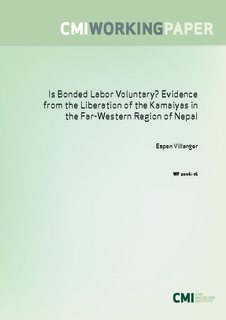Is Bonded Labor Voluntary? Evidence from the Liberation of the Kamaiyas in the Far-Western Region of Nepal
Working paper
Permanent lenke
http://hdl.handle.net/11250/2435789Utgivelsesdato
2006Metadata
Vis full innførselSamlinger
- Bora-import [434]
Sammendrag
The UN estimates that 20 million are held in bonded labor. Several economic analyses assert that bonded laborers accept these contracts voluntarily, which could imply that a ban would make such laborers worse off. We question the voluntary nature of bonded labor, discuss different theories and new evidence on the issue, and propose a new mechanism whereby landlords keep workers trapped.With different types of landlords not revealed to the laborer, we show how some landlords manipulate loan terms so that the laborer becomes bonded if futurelabor is rendered as collateral. Enforcement mechanisms and the monopolistic market for credit thus play a joint role. Providing alternative sources of credit, offering proper conflict resolution institutions for settling labor-contract disputes and banning the practice of bonded labor could emancipate bonded laborers, which would make them better off.
Utgiver
Chr. Michelsen InstituteSerie
CMI Working paperWP 2006: 16
